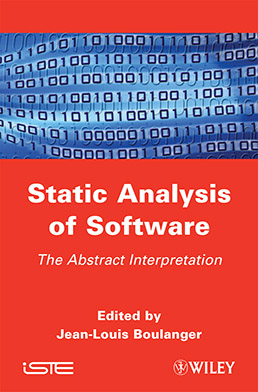
This book presents real examples of the formal techniques called “abstract interpretation” currently being used in various industrial fields: railway, aeronautics, space, automotive, etc.
The current literature seems to only provide very general books on the formal techniques. The purpose of this book is to present students and researchers, in a single book, with the wealth of experience of people who are intrinsically involved in the realization and evaluation of software-based safety critical systems. As the authors are people currently working within the industry, the usual problems of confidentiality, which can occur with other books, is not an issue and so makes it possible to supply new useful information (photos, architectural plans, real examples).
1. Formal Techniques for Verification and Validation, Jean-Louis Boulanger.
2. Airbus: Formal Verification in Avionics, Jean Souyris, David Delmas and Stéphane Duprat.
3. Polyspace, Patrick Munier.
4. Software Robustness with Regards to Dysfunctional Values from Static Analysis, Christèle Faure, Jean-Louis Boulanger and Samy Aït Kaci.
5. CodePeer – Beyond Bug-finding with Static Analysis, Steve Baird, Arnaud Charlet, Yannick Moy and Tucker Taft.
6. Formal Methods and Compliance to the DO-178C/ED-12C Standard in Aeronautics, Emmanuel Ledinot and Dillon Pariente.
7. Efficient Method Developed by Thales for Safety Evaluation of Real-to-Integer Discretization and Overflows in SIL4 Software, Anthony Baïotto, Fateh Kaakaï, Rafael Marcano and Daniel Drago.
Conclusion and viewpoints, Jean-Louis Boulanger.
Jean-Louis Boulanger is currently an Independent Safety Assessor (ISA) in the railway domain focusing on software elements. He is a specialist in the software engineering domain (requirement engineering, semi-formal and formal method, proof and model-checking). He also works as an expert for the French notified body CERTIFER in the field of certification of safety critical railway applications based on software (ERTMS, SCADA, automatic subway, etc.). His research interests include requirements, software verification and validation, traceability and RAMS with a special focus on SAFETY.